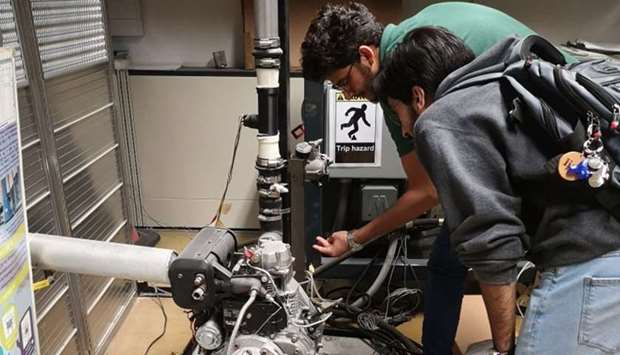Senior engineering students at Texas A&M University at Qatar (Tamuq) who spent the better part of two semesters designing, building and testing a car, continued to collaborate virtually to finish their project and turn in the final report though they did not get to race in this year’s Shell Eco-Marathon in Malaysia.
The Shell Eco-Marathon Asia is an annual competition for teams in the Asia Pacific and Middle East regions. More than 100 teams from all over Asia and the Middle East test their self-built, energy-efficient cars in the Shell Eco-marathon Mileage Challenge to see which team can travel the farthest using the least amount of energy.
The students — Syeda Manahil Akhter, Mubarak al-Sowaidi, Ayan Zia, Anurag Srivastava, Faisal al-Hababi, Mohamed Qureshi, Hassan Haider, Youssef Mortada, Sami Auji, Abdullah Yousuf and Omad Khodr — are all mechanical engineering majors who graduated in May and were working on the car as part of their senior capstone design project.
They had to abandon finishing building their car in early March when Tamuq closed its physical doors due to the Covid-19 outbreak. But instead of giving up in frustration, the students continued to collaborate virtually to finish the project and turn in their final report.
The project gave the students a chance to work together much like they would expect to find in the workplace. Team manager Akhter said, “We started with the computer design during the fall semester. We had meetings to discuss ideas and solutions, and then we started ordering and fabricating parts to build the car. We’re still trying to find ways to perfect the design. It’s disappointing, especially not being able to compete in the race, but we’ll pass the torch to next year’s team.”
A major challenge was simply logistics: the scope of the project was so huge and so many parts needed to be ordered or fabricated since the team had trouble sourcing what they needed from local vendors. This meant the students needed to have their design — on paper — completed early enough to get the parts together.
Zia said working together on the project was not a problem since most of the team members knew each other so well from study abroad and projects they’d worked together during their time together. “The whole team just came together,” Zia said. “We broke up into smaller subsystems and sub teams, and each did their jobs. Every engineer needs to have hands-on experience because it makes you think in a different way.”
With their eye on graduating and joining the workforce, the students said they made the most of their time on the project by developing and polishing the skills they’ll need to succeed in the workplace. Among the skills students learned in the course of their capstone project were teamwork and communication — both with each other and with experts and working professionals — along with time management, project management, leadership and how to handle stress.
The students — Syeda Manahil Akhter, Mubarak al-Sowaidi, Ayan Zia, Anurag Srivastava, Faisal al-Hababi, Mohamed Qureshi, Hassan Haider, Youssef Mortada, Sami Auji, Abdullah Yousuf and Omad Khodr — are all mechanical engineering majors who graduated in May and were working on the car as part of their senior capstone design project.
They had to abandon finishing building their car in early March when Tamuq closed its physical doors due to the Covid-19 outbreak. But instead of giving up in frustration, the students continued to collaborate virtually to finish the project and turn in their final report.
The project gave the students a chance to work together much like they would expect to find in the workplace. Team manager Akhter said, “We started with the computer design during the fall semester. We had meetings to discuss ideas and solutions, and then we started ordering and fabricating parts to build the car. We’re still trying to find ways to perfect the design. It’s disappointing, especially not being able to compete in the race, but we’ll pass the torch to next year’s team.”
A major challenge was simply logistics: the scope of the project was so huge and so many parts needed to be ordered or fabricated since the team had trouble sourcing what they needed from local vendors. This meant the students needed to have their design — on paper — completed early enough to get the parts together.
Zia said working together on the project was not a problem since most of the team members knew each other so well from study abroad and projects they’d worked together during their time together. “The whole team just came together,” Zia said. “We broke up into smaller subsystems and sub teams, and each did their jobs. Every engineer needs to have hands-on experience because it makes you think in a different way.”
With their eye on graduating and joining the workforce, the students said they made the most of their time on the project by developing and polishing the skills they’ll need to succeed in the workplace. Among the skills students learned in the course of their capstone project were teamwork and communication — both with each other and with experts and working professionals — along with time management, project management, leadership and how to handle stress.

